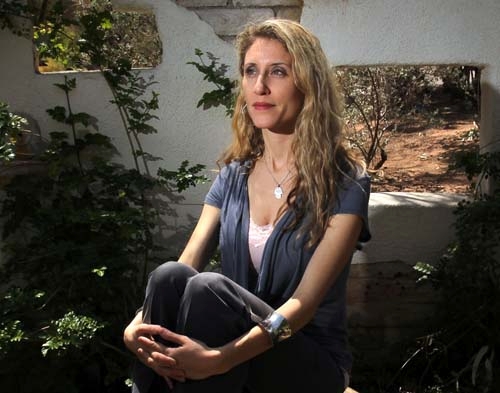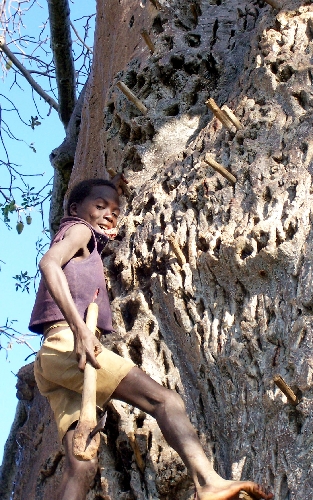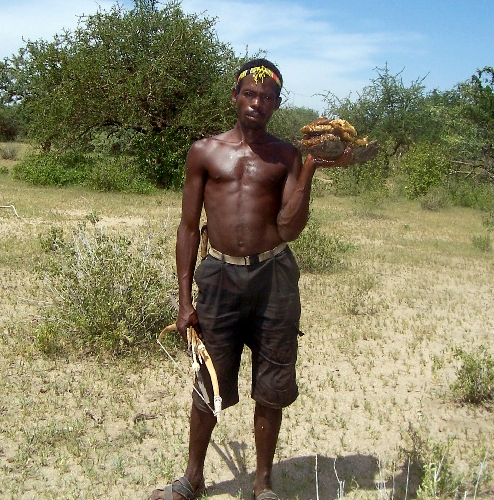Honey’s effects on human evolution excite UNLV anthropologist
Sometimes, life throws things at you. What you decide to do with them can mean nothing.
Or it can mean everything.
Like when Alyssa Crittenden was an undergraduate and she took an introduction to evolution class at the University of California, Santa Cruz.
Whoa. Blew. Her. Away.
"It changed my life," said Crittenden, now an anthropology professor at the University of Nevada, Las Vegas whose most recent study is shaking up the way anthropologists think about the evolution of the human diet.
After that first class threw her a curve ball, Crittenden handled it like this: She gave up on being a doctor, she changed her major, she went on to get a doctorate degree, she decided to study the Hazda people in east Africa, and she noticed something kind-of odd living out there in the bush.
The Hazda simply love honey.
Yes, you're saying right now, of course they love honey. Who doesn't love honey? It's yummy!
Well, yes. But. Would you risk your life to get it?
These folks do.
Which got Crittenden thinking. The wheels churning up in her brain, she began to do some research.
What she figured out might change the way the world sees early humans.
Instead of ferocious hunters stalking game across the African savannah, maybe instead -- or in addition to that -- we started out singing duets with tiny little birds with a craving for beeswax.
•••
Crittenden used to be a kid who waited around with her grandpa for the new issues of National Geographic to arrive every month, so it's not really a shock that she became an anthropologist.
As she grew up, she refined her interests, focused on health and disease, how they relate to reproduction and diet, that sort of thing.
So of course she was a pre-med major when she went off to college.
And then the anthropology class changed everything. She learned about the study of biological anthropology. She learned about how evolution helped design the human body to be more efficient when it lived off some foods, but not some others.
She's become an expert on food and the evolution of the human diet.
Humans evolved first as bands of what anthropologists call hunter-gatherers, which is a pretty descriptive term. Small groups survived by hunting game and gathering wild plant materials to eat. Humans lived this way from about 2½ million years ago until the invention of agriculture about 10,000 years ago.
One way to get a glimpse into humanity's past is to get familiar with the people who still live that way, mostly.
There aren't many of those groups left. One of them is the Hazda people, a small population in Tanzania.
Over the last eight years, Crittenden has studied them. She lives with them sometimes. She's become good friends with many of them.
She noticed the honey thing. When asked what their favorite food was, virtually every member of the group said honey.
But it's not like these people can just get some at 7-Eleven. They have to work for it. Often, it's guarded by hives of killer bees.
So, they get help from the honeyguide, a bird. Mostly, it's the men who do this.
They'll go out looking for honey. This bird will know where it is. The bird will notice the honey hunter, and the bird will chirp out a song.
The hunter will answer. They'll go back and forth. The bird will eventually lead the hunter to the hive, which is often burrowed deep inside a really high branch on a tree.
The hunter makes his way up there, with great difficulty. He smokes out the bees, which calms them. He breaks the branch open with tools, snags the honey, brings it back to his people, and everyone digs in.
The bird cleans up on the remains; bee carcasses and beeswax are a particular favorite.
•••
Why expend so much effort to satisfy a sweet tooth?
This is the question that drove Crittenden.
She researched the literature. She found references to cave art drawings of honey extraction from tens of thousands of years ago.
Apparently, honey's been a big deal to people for a long time.
There are also plenty of other primates -- chimpanzees, baboons, etc. -- who eat honey, too.
Crittenden also knew that human brains got much bigger a couple million years ago, right around the same time people started using complicated tools.
Big brains are great. They're what makes us people.
But they're also expensive. They require lots of energy to maintain.
"What happened 2 million years ago that all of a sudden, we starting seeing these things coincide?" Crittenden said.
There had to be a fairly substantial change in diet.
The theory, in general, has always gone like this: The new tools those big brains allowed people to create were used to hunt meat, which gives lots of energy, protein and fat, all of which is good for a big brain.
"Most of the debate has focused on meat versus plant foods," Crittenden said.
There's ample fossil evidence to back this up.
But is it really that simple?
Maybe, Crittenden thought, there was more. Maybe honey, which leaves no fossilized evidence behind, was a big deal too.
Honey is energy dense, after all. And in the wild, the stuff is packed with bee larvae, which is full of fat and protein.
So, Crittenden wrote all this up, published it in an academic journal.
Smithsonian magazine covered this on its website. It's gotten lots of attention. It's not common for a single idea to throw a wrench into everything we thought we knew in a field that's more than a century old.
"People have been so caught up in this meat vs. plant foods debate, the idea that it could be honey is counterintuitive," Crittenden said.
All of this isn't just academic. It can have implications in the real world.
Crittenden said we're not supposed to be eating all the processed foods we do. Our bodies weren't designed for it. We can't cope and be healthy.
Looking into how we got where we are, she said, can help us figure out where we should be now, where we're going, and how to get there.
Contact reporter Richard Lake at rlake@reviewjournal.com or 702-383-0307.
























